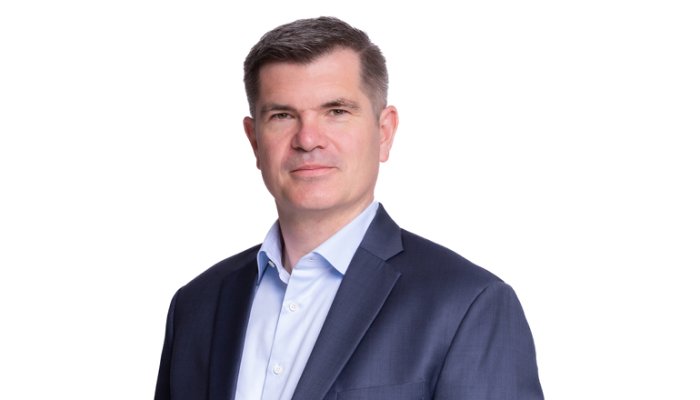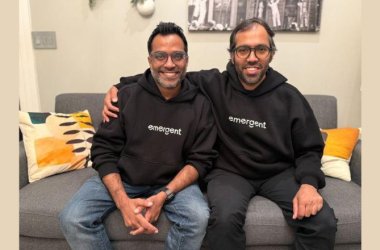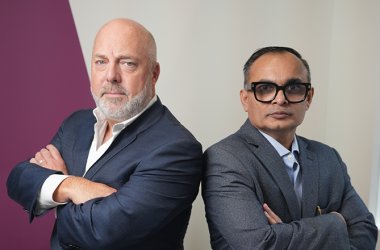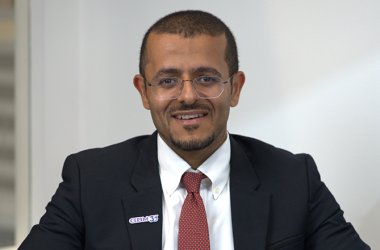CNME Editor Mark Forker sat down with Hannes Liebe, Regional President, APJMEA at IFS, to find why events like IFS Connect in Riyadh are becoming increasingly important as AI continues to transform everything, the critical importance of domain knowledge in solving key business challenges, their differentiated approach to Industrial AI – and how their IFS Cloud unifies ERP, EAM and FSM into one composable platform.

Hannes Liebe has a proven track record of building high-performance teams in what to date has been a hugely impressive career, one that has been him work for companies such as SAP, Finastra and now IFS.
Liebe was initially appointed as the Chief Operating Officer at IFS in April 2024, before his promotion to Regional President, for the Asia Pacific, Japan, Middle East and African markets.
IFS have a series of global roadshows that they take on the road entitled ‘IFS Connect’ – and their Middle East and Africa edition kicks-off in Riyadh, later this morning.
The IFS Connect series drive great value for customers and partners globally, but according to Liebe, one of the most important benefits of the roadshows are the fact that they bring industry peers together to tackle the biggest issues impacting the industry head-on.
“Riyadh is the last stop on what started in the United States. We have been in Japan, Europe and now the Middle East and Africa. I believes the IFS Connect roadshows are inspirational as they allow us to share our vision. There is a very strong focus, and especially in the Middle East region to be very execution orientated. On the other side of the coin, we also want to bring industry peers together to discuss how we jointly as an ecosystem of stakeholders tackle the challenge that is ahead of us. AI is a tectonic change in the physics of our industry, and I think it’s fair to say that nobody has the answer. We are all walking on this journey together, and that’s why I believe these events become even more important whilst we are all in the midst of this tectonic shift in our industry – and there is no better place to have these conversations than Riyadh,” said Liebe.
Liebe acknowledged that there is no general consensus in terms of what is the best approach when it comes to unleashing the potential of AI across the industrial sector.
“I think everyone shares the realisation that AI is fundamentally changing the way we do business. However, the approach in terms of how we address is certainly differs, and I see a wide array of thinking on the matter. On the one side people are looking at it from the point of view that’s it all about execution, and helping me get my job done and I don’t need all this fancy stuff. Then on the other side you have this sort of overhyped element, which is more on the experimentation space. We believe that Industrial AI has to be in context, and has to be at the process level in order to make sense, which is especially acute for us when you consider our focus into heavy asset industries. Traditionally, heavy industries have always been focused on getting the job done. It simply has to work, if you operate in a sector such as Oil and Gas then all the stuff has to work,” said Liebe.
Liebe highlighted the critical importance of domain knowledge when it comes to successfully executing Industrial AI.
“Deep industry domain knowledge is so important, and that is what we have in abundance because we have been building applications in this arena for the last 30 years. Technology is not the key differentiator, domain knowledge and process relevance are the key differentiators. Adopting technology for the sake of it doesn’t work, and that’s the underlying problem with a lot of the investments that have been made into AI. You need to understand the business and you need to establish what the problems are, and then look at how technologically you can solve them, and this is not happening in a lot of industries,” said Liebe.
Liebe explained how IFS adopts a very differentiated approach to AI.
“Our approach to AI has three pillars. The first pillar is Industrial AI that is embedded into our platform IFS Cloud. This is in the moment and in the context where a user can leverage AI capabilities, but it is in the process itself. The second pillar is in the loops, which is Agentic AI, and that solves on a work package level a problem that can be performed by an AI agent. The final pillar is Nexus Black, which is a forward deployed and elite engineering team that goes into customer situations where the end-to-end process coverage is essential. The Nexus Black team built the solution together with the customers onsite and did it in most cases in days and weeks, and not months. However, the critical component in all of this is to really understand how I can solve the business problem, and that is key,” said Liebe.
IFS Cloud has resonated massively with the Middle East marketplace, and Liebe explained the factors behind its success across the Gulf region.
“Our message around Industrial AI, and IFS Cloud as a platform to enable this on the process level has received a hugely positive response from the Middle East market. I think a key part of our success has been the combination of having that composable platform that has AI embedded into it and in a contextual way where it all makes sense. One of our customers is one of the largest utility providers in the Middle East region is using our optimising engine for thousands of their field technicians. It is constantly recalculated as to who goes to which job, at what point in time do they go, and ultimately who is the right person to do the job. That is AI-enabled, because you can’t do that anymore with normal technology, and that’s all in production,” said Liebe.
IFS Cloud unifies ERP, EAM and FSM into one composable platform, and Liebe believes that this is a key market differentiator for the company, describing it as unique.
“It is a unique platform. The merging of asset management, service management and ERP into the one platform with one AI layer and one data model is totally unique in the marketplace. Even if you decide to do one component of it, it’s completely composable. I think given our strong industry focus, and the fact that we are quite narrow helps us. We can deliver the level of depth that our customers would expect, but also at the same time gives us agility because we don’t need to maintain 28 industry solutions, so we are agile. Due to the architecture of the solutions we can also ingest new solutions and new tools much easier,” said Liebe.
In August of this year, IFS announced the acquisition of AI-powered supply chain management provider 7bridges, and Liebe highlighted the positive impact the acquisition will yield for its composable platform.
“We recently acquired 7bridges, and this is an AI simulation tool for automatising logistics and logistical networks, and this acquisition makes a lot of sense when you think about our market footprint that we have in asset heavy industries. We can now through the composability of the platform ingest solutions in a much, much easier way, and it makes sense for us in sectors like defence and manufacturing,” said Liebe.
Countries such as the UAE and the KSA have made no secret of their ambitions to become leaders in sustainability, but the economies, especially that of the KSA are heavily dependent on the asset heavy industries such as Oil and Gas.
We know that the KSA is trying to diversify its economy and reduce its dependency on Oil and Gas through its Vision 2030 plan, but the issue of sustainability remains a pertinent subject.
AI is energy-intensive, and the demand for AI datacentres is set to grow exponentially in the next few years across the Middle East following the announcement of the Stargate project.
Liebe believes AI can be a solution to the sustainability challenge facing companies from asset heavy industries, who are under pressure to become more sustainable.
“Sustainability has moved from being a CSR activity, but it moved to become a true boardroom consideration, and in the Middle East it became a national imperative. The level of energy intensity in asset heavy industries has to be reduced, but in fact, many of them are leading in green transformation. Many of them are pressing ahead and are saying we’re going to be the first to do this because we understand this now. What IFS and AI can do here is expose inefficiencies in the process. Take predictive maintenance in its raw form, ultimately it reduces a waste of energy. If I schedule a service technician more effectively then I save on kilometres that they drive means I have reduced my carbon footprint. If you do that on top of your logistics then your carbon emissions are drastically reduced. There is a big angle to all of this that we haven’t tapped into yet as an industry, but I think think this opportunity will eventually emerge, and when it does it will be lucrative. If I can reduce overproduction for a customer then that’s a lucrative opportunity,” said Liebe.





